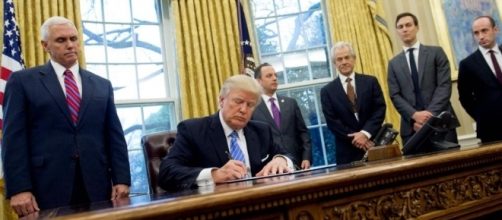The President of the U.S. added his signature to a series of executive orders on Friday. They request a thorough evaluation of specific tax legislations from 2016 that involve two distinctive audits set on repealing money related sanctions imposed by Dodd-Frank. Donald Trump sought out the U.S. Treasury to sign the orders. He said the department needs to assist American citizens with accomplishing their financial goals so they can have a genuine trust in them later. He affirmed to the White House that there would be a significant declaration on next week concerning reform on taxes.
New duties assigned to U.S. Treasury
The first executive order requires the Treasury Secretary to examine all distinct tax laws enacted in 2016 and decide whether they force U.S. citizens to endure an unfair financial burden. Trump wants to know if the federal regulations are unnecessarily intricate, make pointless necessities, or surpass legal permissions under rules of the law.
The White House declared last week that Steven Mnuchin has a total of 150 days to deliver the data to the commander-in-chief. The request likewise requires the U.S. Treasury and the Office of Management and Budget to reexamine the procedures surrounding administrative reviews on new tax laws.
Before Trump signed the order, he referred to the Treasurer's future duties as a primary assignment.
He informed him that a substantial portion of America is unable to file its tax returns correctly. He insisted that U.S. citizens are unaware of how to them citing that they appear to be excessively confused.
Earlier that day, Mnuchin was questioned during an exclusive briefing with the press whether he finds his future audit progress in Congress’ and the president’s hopes to reveal their tax reform package. He affirmed that his duty arrangements shouldn’t have a critical impact.
The president asserted that continued strides towards tax reform would diminish everyone’s tax rates, especially middle-class individuals. He believes the federal government needs to lower business taxes. As he marked on the activities, Trump suggested he conduct his new declaration on taxes next week.
However, did not offer any more information on what he planned to include in that announcement.
Trump signs a set of government actions
In addition to the first order, Trump signed a pair of memorandums discussing the 2010 Dodd–Frank Wall Street Reform and Consumer Protection Act. Former U.S. President Barack Obama originally signed this executive order during the fiscal crisis that occurred between 2007 and 2008.
One memo mandates the U.S. Treasury to audit Dodd-Frank's Orderly Liquidation Authority. The department must conclude whether it persuades Americans to take risks or enables them to endure additional financial obligations. The notice requires reporting this information to the Trump administration in no later than six months from now.
In the second note, Trump calls for an additional six-month survey. It’s aimed at evaluating the policies and procedures implemented by the Financial Stability Oversight Council.
Trump stated during his order signing, "These directions empower unsafe conduct. My administration is finding a way to make our economy more reasonable and a sense of prosperity for us all."
Republicans say the assignment doesn't genuinely connect with the times. When questioned at the meeting on whether this was the government’s opportunity to dispose of corporations too big to fail, Mnuchin stated, "President Trump dedicates his efforts to Americans. He wants it ensured to them that his administration is not putting them at risk of government bailouts.”

